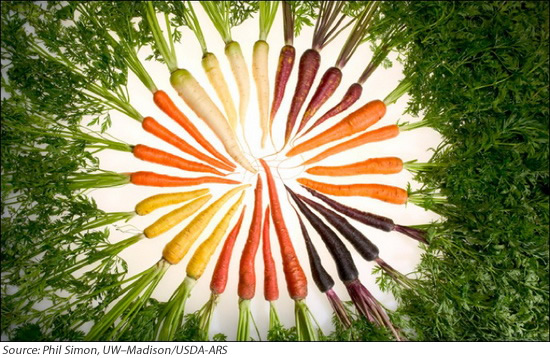
Scientists Crack Complete Genome of Carrot
May 11, 2016| |
A team of scientists led by Phil Simon from the University of Wisconsin–Madison cracked the complete genetic code of carrot, which is published in Nature Genetics. The carrot genome has over 32,000 genes arranged among nine chromosomes, which code for pest and disease resistance, colorful carotenoids, and other traits.
"The carrot has a good reputation as a crop and we know it's a significant source of nutrition — vitamin A, in particular," Simon says. "Now, we have the chance to dig deeper and it's a nice addition to the toolbox for improving the crop."
The present-day orange carrot was once white in color and found in the wild. The first cultivated carrots were recorded 1,100 years ago in Central Asia, which were purple and yellow. The orange carrot appeared in 1500s in Europe. The research could not explain why the first cultivated carrots were purple and yellow, though it proves that it is not because of flavor because there was no link found between the genes that code for color and flavour. The research reveals that the overexpression of orange pigments is an accumulation that normally wouldn't happen in evolution. A gene (Y) was identified to be the cause of the difference between white carrots and yellow or orange ones, and that a variation of it leads to the accumulation of carotenoids.

Read the media release from University of Wisconsin–Madison.
| |
Biotech Updates is a weekly newsletter of ISAAA, a not-for-profit organization. It is distributed for free to over 22,000 subscribers worldwide to inform them about the key developments in biosciences, especially in biotechnology. Your support will help us in our mission to feed the world with knowledge. You can help by donating as little as $10.
-
See more articles:
-
News from Around the World
- Report Shows Global Trends and Forecasts on GM Food Safety Testing Market
- University Students in Uganda Debate on Biotech and Biosafety Bill
- Researchers Discover Potential New Pathway for Plant-Based Bioproducts
- Scientists Crack Complete Genome of Carrot
- Pakistan's Punjab Seed Council Holds Approval of Bt and Non-Bt Cotton Varieties
- Genome Modifications Turn Fungal Plant Pathogen into Beneficial Organism
- Scientists Explain Why Pest Has Not Evolved Resistance to Bt Maize in EU
- DEFRA Approves The Sainsbury Laboratory's Application for Potato Field Trials
-
Research Highlights
- Transcriptional Response of Overexpressing Anthranilate Synthase in Rosy Periwinkle
- Abscisic Acid and Sucrose Regulate Fruit Ripening through the ASR Transcription Factor
- The Role of Short Vegetative Phase-Orthologs in Herbaceous Perennial Gentian
-
Beyond Crop Biotech
- Researchers Find Link between Jumping Gene and Colon Cancer
-
From the BICs
- UBIC Embarks on Nation-wide Biotech Radio Campaigns
- Indonesian Gov't Officers Attend Workshop on Biosafety Assessment and Release of GE Product
- Agri Technology Seminar Concluded in Tegal, Indonesia
-
Read the latest: - Biotech Updates (December 17, 2025)
- Gene Editing Supplement (December 17, 2025)
- Gene Drive Supplement (February 22, 2023)
-
Subscribe to BU: - Share
- Tweet
